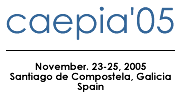|
Topics of interest
As in previous editions, the goals of the Conference will be:
- to create the appropriate conditions for researchers to disseminate their research work
- to strengthen the relationships among the AI research groups
- to facilitate the contact between new researchers and consolidated groups
- to help the diffusion of new developments to the community.
In order to fulfill these objectives, submissions of substantial, original
and previously unpublished work are invited in all areas of Artificial Intelligence.
Topics of the conference include but are not limited to:
- AI foundations. Knowledge representation..
- Machine learning. Knowledge discovery. Data mining.
- Evolutionary computation. Genetic algorithms.
- Neural networks. Neuro-symbolic integration.
- Robotics. Perception and vision. Pattern recognition.
- AI architectures. Multiagent systems. Distributed AI. Ubiquitous computing.
- Reactive control. Real time AI.
- Knowledge engineering. Knowledge management./li>
- Ontologies. Knowledge acquisition. Knowledge reuse. Verification and validation.
- Decision support systems.
- Semantic web.
- Model based reasoning, Qualitative reasoning, Causal reasoning, Abductive reasoning, Case based reasoning.
- Non-monotonic reasoning. Belief Revision.
- Approximate reasoning. Bayesian reasoning.
- Constraint satisfaction. Planning and scheduling. Optimization. Temporal reasoning. Spatial reasoning.
- AI applications. AI for diagnosis, configuration and design. AI in education.
- Natural language processing.
- Intelligent interfaces. User models. Multimodal interfaces. Collaborative agents.
- Intelligent multimedia. Virtual reality. Augmented reality.
Types of submissions
- Full papers
A maximum length of 10 pages, which will be presented in ~20 minutes. They must consist of original,
relevant and previously unpublished sound research results related to any of the topics of the
conference.
- Short papers
A maximum length of 4 pages, which will be presented in ~10 minutes. They must be original on-going
research related to the topics of the conference.
- Doctoral consortium
PhD students are invited to present the topic and progress of their research, in order to obtain
feedback from a panel of experts. The length of these papers should be no longer than 4 pages.
Submited papers must be written in Spanish or English.
Along with the notification of acceptance the program committee may suggest to the authors a change in
the type of submission, after analyzing the scientific and technical quality, and the relevance of the
contribution.
Publication
All accepted papers (full and short) will be published in the conference proceedings edited by the organization (with ISBN).
After the conference, authors of full papers will be invited to send a new version of their works in English.
This version may contain the latest updates. These versions will be reviewed again by the program committee
and published by an international well known publisher (TBA).
At least one author of each paper must register for the conference before the early registration deadline.
The submission of the paper implies its oral presentation at the conference.
Awards
As a recognition of the research work, there will be awards to the best full paper (CAEPIA), the best
on-going research (Doctoral Consortium or Short Paper) and the best application.
Workshops
People interested in organizing a workshop within the conference are kindly invited to send
a proposal description before May 13th, including:
- Title.
- Brief description (up to 1.000 words/two pages) including goal and topics.
- Organizers, program committee, selection process, planned activities and potential number of participants.
Tutorials
People interested in organizing a tutorial within the conference are kindly invited to send
a proposal description before May 13th, including:
- Goals.
- Previous knowledge required (for the audience).
- Duration.
- Contents.
- Brief curriculum of the speaker.
|



